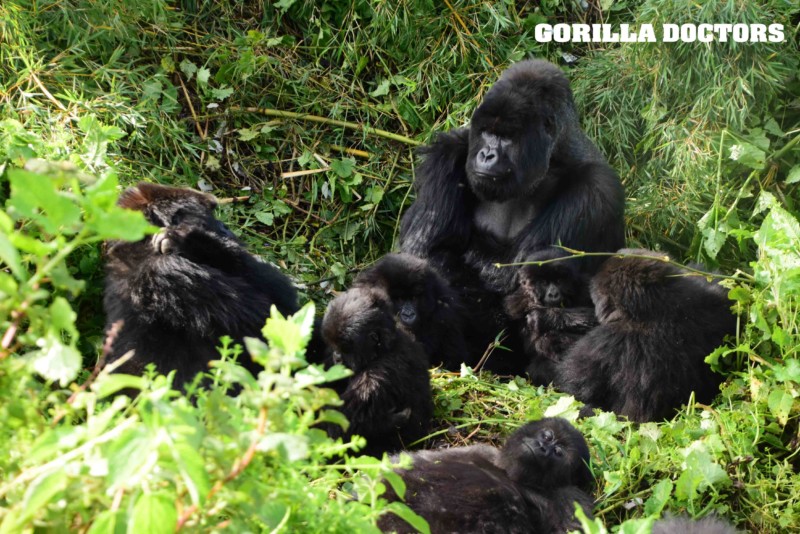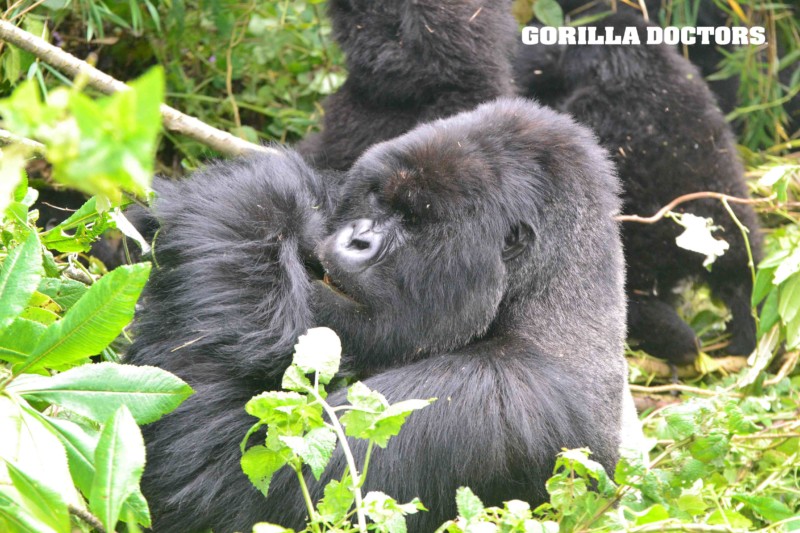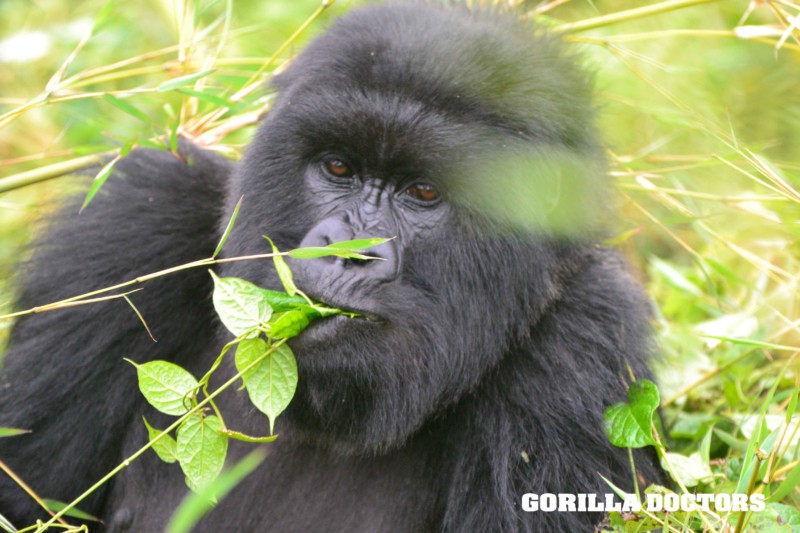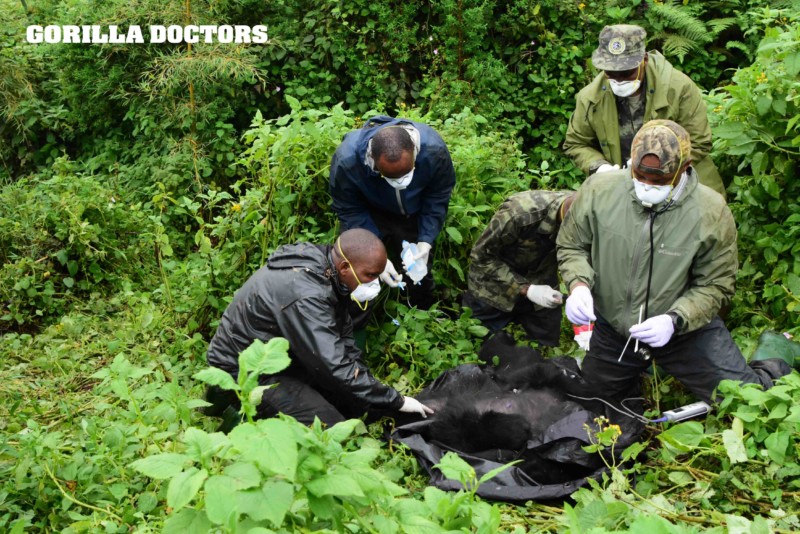Gorilla Doctors Treat Mountain Gorillas for Respiratory Infection
By Gorilla Doctors Staff on Friday, January 31st, 2020 in Blog.Since January 3rd, Gorilla Doctors Rwanda team has been closely monitoring and treating mountain gorillas in Isimbi group for a respiratory disease outbreak. What follows is a timeline of our monitoring visits, clinical interventions and a report on the unfortunate death of adult female Duhirwe and the loss of her pregnancy. We will post a follow-up once the outbreak is resolved or we have new updates. Please check back or sign-up to receive blog post notifications by clicking on ‘Subscribe for Updates’ on this page.
Clinical Diagnosis: Respiratory Disease Outbreak, Isimbi group
Location: Volcanoes National Park, Rwanda
Gorilla Doctors: Drs. Jean Bosco (Noel) Noheli, Gaspard Nzayisenga, Methode Bahizi and Adrien Ntwali
Start Date: January 3, 2020
End Date: Ongoing
————————–
January 3rd: Isimbi group is comprised of 21 mountain gorillas led by silverback Muturengere, the only silverback in this group. Trackers report signs of frequent coughing in adult female Ruhuka, to Elizabeth Nyirakaragire, Veterinary Officer for RDB, who notifies Gorilla Doctors. Together, they plan a visit for the following day.
January 4th: Our veterinarians conduct a monitoring visit of Isimbi group and confirm Ruhuka’s coughing. We also find her lethargic with a reduced appetite but she continues moving with the group. We also note that silverback Muturengere and adult female Duhirwe both have a mild cough but it does not appear to impact their overall behavior. Juvenile Umuseke sneezes once during monitoring.
January 5th: The veterinary team finds Ruhuka actively feeding about 200 meters from the rest of the group. Ruhuka’s infant is relaxing with Muturengere who is with the rest of the group. Ruhuka is coughing less and her activity is improved. By the end of the monitoring visit, she joins the rest of the group. However, Muturengere and Duhirwe are still coughing and a new case is observed, adult female Pasika, who coughs twice in 45 minutes. The coughing does not seem to impact the overall activity of Muturengere or Pasika, but Duhirwe is lethargic and feeding less than normal.
January 7th: Our veterinary team returns to find Ruhuka still improving, with her behavior almost back to normal. Clinical symptoms continue in silverback Muturengere and females Duhirwe and Pasika. Infant Isuku and adult female Africa exhibit mild symptoms, suggesting the respiratory infection is progressing throughout the group.
January 9th: Our team finds that both Muturengere and Duhirwe’s clinical signs are worse. When they first arrive, Muturengere is still in his night nest and while Duhirwe is moving with the group, she stops and lies down every 5 to 10 meters. The veterinarians decide to administer antibiotics via dart to both Muturengere and Duhirwe.
January 13th: We conduct a follow-up monitoring visit and find Muturengere’s clinical signs are improved, suggesting that he is responding to treatment. Duhirwe is not showing signs of improvement, so Dr. Noel, accompanied by the veterinary team, administers a second dose of antibiotics via dart. Close monitoring will continue.
January 17th: Despite two doses of long-acting antibiotic and a single dose of anti-inflammatory, the veterinarians observe that Duhirwe is not improving. She is still coughing with a shallow breathing rate and her appetite remains poor. She is able to keep up with group movements but a full intervention for more intensive treatment is discussed with park authorities.
January 19th: Our veterinary team, with support from Volcanoes National Park staff, conducts a full intervention, anesthetizing Duhirwe so that we can perform a physical exam and administer additional medication (antibiotics, anti-inflammatory, vitamins, fluids). Upon arrival, they find Duhirwe in the same place where she was the day before, away from the group, and holding an aborted fetus. Our veterinarians anesthetize her, complete an exam and administer medications. Afterwards, the team carries Duhirwe through dense vegetation and rain so that she can wake up within close proximity of her group, which has continued moving during the clinical intervention. Daily monitoring of Duhirwe’s critical condition continues.
January 20th: The team finds Duhirwe, far behind the group, mostly resting and moving very little, and not feeding.
January 22nd: Duhirwe is found dead, her body not far from where she was seen the previous two days. Other members of the group are recovering from the respiratory outbreak and do not require additional treatment. Daily monitoring of the group will continue. Duhirwe’s body is transported to Gorilla Doctors’ post-mortem facility.
January 23rd: Our veterinary team conducts a post-mortem examination of Duhirwe and preliminarily determines the cause of death to be bronchopneumonia (likely a result of bacterial and viral infection). They surmise that her severe respiratory disease likely caused her to miscarry her fetus.
A Note from our Executive Director: This respiratory outbreak highlights two key aspects of our work monitoring the health of mountain gorillas: 1) respiratory infections can change or spread quickly, and daily monitoring allows us to intervene when necessary; and 2) the time, energy and resources that go into monitoring and treatment is an intensive team effort.
Death (and miscarriage) are always a potential outcome when a gorilla is seriously ill or injured, and when it happens, we feel the loss keenly, knowing that the population will not benefit from the lifetime reproductive potential of both of these lost individuals. These outbreaks and their consequences strengthen our resolve to do everything we can to protect the health of each individual gorilla patient, which is vital to the continued growth of the entire population.


 Donate
Donate




